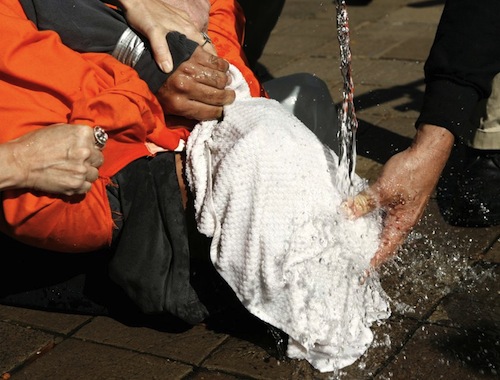In all the rush of moving, celebrating our nation’s independence from Britain, and getting on a plane at six in the morning to go to Iowa—plus keeping up with our drinking—Combat! blog missed this gem about the New York Times and the word “torture” in Salon. Overdue props to Pete Jones for the link. The Times, like most newspapers, had used “torture” to refer to waterboarding until shortly after the September 11th attacks, when the Bush administration quietly explained to editors that A) it was waterboarding the shit out of everybody and therefore B) waterboarding was obviously not torture. After that, the Times started referring to waterboarding as “intense interrogation techniques” or “the harsh techniques used since the 2001 terrorist attacks.”
In April, a Harvard study pointed out that newspapers had used the word “torture” to describe waterboarding for 100 years, and that the conclusion of that era happened to coincide with the sitting President telling various editors about his new torture policy. History nerds who thought a free press might conceivably play some role in their government not personally torturing them were upset, and the ensuing mini-storm prompted Times executive editor Bill Keller to issue an apology. Unfortunately, it was an “apology” in the medieval sense of the word—not so much “I’m sorry I euphemised torture” as “it’s okay that I did.” And I quote:
I think this Kennedy School study—by focusing on whether we have embraced the politically correct term of art in our news stories—is somewhat misleading and tendentious.
There it is! “Politically correct,” the most versatile epithet in the modern language, rides again. The best part of Keller’s use of the phrase—the part that transcends the semantic to border on the moral—is that it’s pretty much the opposite of the expression’s original meaning. The word “torture” is emphatically not politically correct. It conjures all the historical ugliness of the act, whereas “intense interrogation techniques” just makes it sound like “Danger Zone” is playing. If you’re looking for instances of real political correctness and you’re not allowed to just steal them from George Orwell essays, the rebranding of waterboarding in the Times under Keller is prime sirloin.
There are two problems at work in all this. One is the historical role of a free press as a check on governmental power, which here seems to have been abandoned with neither hesitation nor subtlety. It’s hard to imagine an uglier scenario than one in which the sitting President, shortly after adopting a practice universally regarded as torture, calls together the heads of various news outlets and instructs them to implement a new editorial policy that makes it sound better. That is some China shit, right there, and it makes me less sympathetic to the argument that newspapers like the Times are bulwarks of democracy that must not fall to unprofessional internet journalism. If this is the protection that old-school journalists offer, I’ll take my chances with Wonkette.
The second problem is aesthetic, but I personally find it more disturbing. Bill Keller is a writer, and presumably he has predicated his adult life on the proposition that words mean something. His willingness to rename waterboarding according to who lives in the White House is gross, but his subsequent invocation of political correctness seems unholy.
“Politically correct” is such an evil phrase because it indicts its own real function. It issues forth on the presumption that the speaker wants to use words as directly and efficiently as possible, and that the “politically correct” are trying to make what we call a thing more important than the thing itself. In reality, of course, that man accusing others of political correctness has most likely just used words as a cudgel, making black people “colored” and torture victims the subject of “intense interrogation.” He is insisting on his own statement by claiming that others are too hung up on phrasing.
The argument against political correctness is invariably an argument for semantics over substance; it’s the attempt to shift the blame from what you said to the way you said it. In Keller’s case, the problem is not that it suddenly became fashionable to call waterboarding torture again and he fell victim to political correctness. It’s that he used words to hide meaning rather than convey it, and when he got caught he accused everyone else of doing same.
I think waterboarding is torture, but I could forgive Bill Keller for thinking it isn’t. It’s ugly to think he changed his mind because the President told him to, but that’s within the realm of decency. What’s gross is the possibility that he didn’t change his mind at all and, having devoted his life to telling the truth, figured out a new way to say what he didn’t mean.





I would love to see Obama go to screwball extremes on some issue or another the way Bush used to, to be just so blatantly out there that he somehow forces media outlets to redefine the very terms of the debate. Could nuclear arms abolition become “strategic redeployment”, for instance?